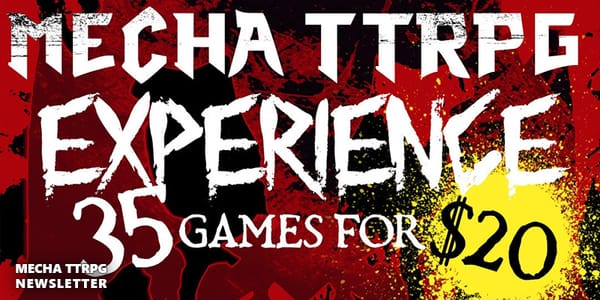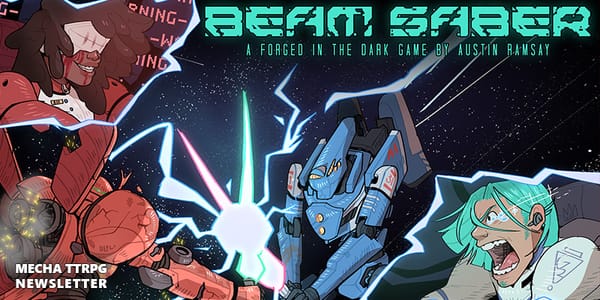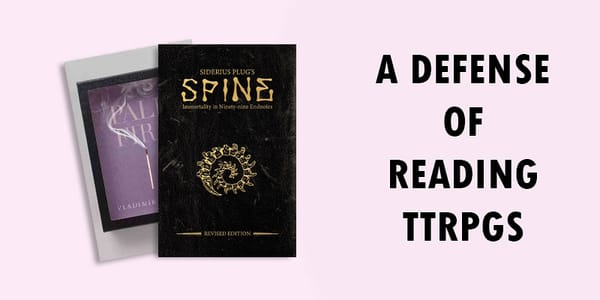Interview: Liz Little on Games and Ergodic Lit
An interview with Liz Little on Games and Ergodic Literature
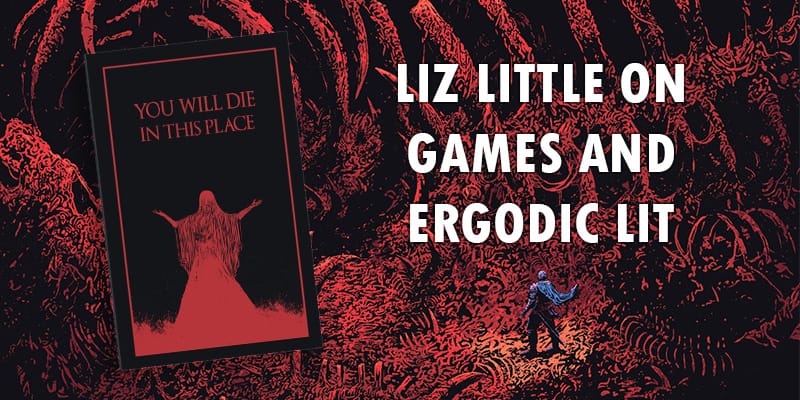
This interview is one of several following a series of essays on how we play with books in tabletop RPGs, leading up to a game that I’ve been working on called SPINE, a Pale Fire-inspired rpg in which the book is the game and vice versa. I've been interviewing game designers about how games use books as props, anchors, and artifacts of play.
But now I'd like to think about it from the perspective of tabletop RPGs that insist on being read. I'm especially interested in what I call a text-first RPG like Jenna Moran’s WTF (2009) or Hugh Dingwall’s and Vishãla Jecik’s Normality (2009), a game that “uses its claim to be a TTRPG to do other things as a text.” In my opinion, these are games that force us to consider reading as a form of play.
Liz Little, author of the House of Leaves-inspired ttrpg You Will Die in This Place (YWDITP), is the obvious choice! And her game is currently crowdfunding on Gamefound.
Liz, you released a preview of You Will Die in This Place earlier this year, and it absolutely blew up overnight on Bluesky after it was featured in an essay on Split/Party. A large part of that success is due to not only its pastiche of House of Leaves and the ergodic elements of YWDITP but also the very original ideas in the game, the characters that you craft in the metanarrative, and the exploration of what it's like to be trans and a game designer. I was almost overwhelmed by all of the cool things in the book, and I'm excited to see what new things I discover in the next read or that I experience when I play it.
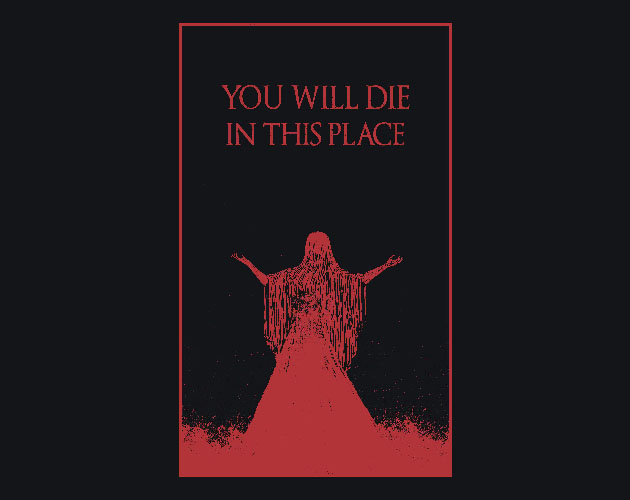
The Development Preview on Itch for You Will Die In This Place by Liz Little.
But to start us out, I want to note that I just called YWDITP a game, and I called it a book too. One of the things that I grapple with in my essays is about the labels that we use with ttrpgs — are they games, books, rulebooks, etc.? YWDITP sits at a unique intersection in ttrpgs as a game with an ergodic metanarrative.
As the author of YWDITP, is it a game or a book?
[Asa] As the author of YWDITP, is it a game or a book?
[Liz] Right, well, that’s the big question really, or a variation of it. What actually is this thing? And I have to admit that it’s one I’ve struggled with. I think, ultimately, from my point of view, the answer is that it has to be both. I’ve described it as a nihilistic dungeon crawler and I’ve described it as a postmodern horror novel, but it really isn’t a thing of two disparate halves. The game part and the metanarrative part are so inexorably intertwined with each other that neither can truly exist without the context provided by the other. I won’t go too much into layers of themes here because it’s probably something I’ll talk more about later, but ultimately it is a work of different approaches to the same shared themes. It is a game that is also a book.
With that said, I’m just the author and I’m sure that other people might have some different opinions on the matter. I have no formal qualifications in literary theory or literary criticism, being a physics graduate and a high school teacher by training. Still, language is something that’s always been deeply fascinating to me and I’ve written quite a lot about it and the importance of having the language to describe things. So, I won’t fault people for wanting to have words to use as labels. Saying something is a book or saying something is a game immediately confers a lot of contextual information to someone about what a thing is likely to be like. However, I think there’s a danger in the inherent biases that labels can carry, as well as the fact that it isn’t a truly shared language. What ‘book’ says to me in a vacuum might be quite different to someone else. I fear I’m digressing into the realm of Derrida here, so let’s leave it at that for now.
What are the implications of calling it a book or a novel versus a game?
[Asa] Well, that leads nicely into my follow-up question. Does it matter what we call YWDITP? For example, you have also called it a post-modern horror novel. What are the implications of calling it a book or a novel versus a game?
[Liz] I’m not sure that it does matter, although I think I would be a little sad if the game part of it was completely ignored. Partly due to the amount of work and thought that went into some of the mechanical aspects, but also because the game part is fundamentally necessary to the act of fully engaging with the metanarrative. Now, with regards to the implications, there definitely are some.
I’m no marketing expert. I’m terrible at it and in fact I loathe having to do it at all, but I jokingly posted on BlueSky about how people who enjoy Dungeons and Dragons might also enjoy You Will Die In This Place. It was a tongue in cheek post that I don’t think anyone was in danger of taking the wrong way, but there is something to that. If I call it a game, it creates certain expectations that might not be met. If people just look at the artwork and go into this expecting a more traditional game, they will likely have a confusing and uncomfortable experience. Similarly, I have already encountered instances of the literary aspect of the project being immediately dismissed simply because it is a game and a game cannot, apparently, be literature.
On the other hand, calling it a book immediately implies that the game part of You Will Die In This Place is more for show than anything else. A kind of set dressing that exists for no real reason other than to be the thing Samantha is talking about. I strongly disagree with that take, though it is certainly true that the game is intentionally obtuse, misleading and unbalanced in places. However, it is this intentionality that plays into the overall themes of the work, just as Samantha or Charlotte might make incorrect or questionable statements at times. My hope is that it invites people to question why it is the way that it is and what that might mean.
[Asa] I think we should come up with our own label for YWDITP. For example, I love that on itch.io, Jay Dragon, who has called Yazeba's "House of Leaves if it were nicies," labels Yazeba's Bed & Breakfast as "a downloadable bed & breakfast" rather than "a downloadable slice-of-life fantasy ttrpg." Perhaps YWDITP is "a downloadable labyrinth."
[Liz] That might be a little too whimsical for my sensibilities, but if it was going to be anything like that, a labyrinth is certainly what it would be. Jay is great though and people should check out Yazeba's.
I think I'm mostly just content to resign myself to saying 'it is what it is' and let other people make of it what they will. What is it that House of Leaves says? 'This is not for you'? You Will Die In This Place certainly exists within a niche and somehow it managed to find some people who appreciate it, despite my terrible efforts to put it out there or explain it to people.
I was actually contemplating giving up on the project when, prompted by a few friends who'd read some earlier parts, I sent a few copies out into the world with a half-hearted bit of marketing copy that didn't really do it justice at all. One of those emails is what found its way to Split/Party.
[Asa] I really appreciate your answer because my question was a trap with no easy reply. Have I mentioned that I'm a horrible interviewer?
[Liz] Oh, I like an interview with some traps. Now we're really navigating a labyrinth.
How is reading a form of play?
[Asa] But I think it's quite clear that the game is meant to be played collectively, as its rules propose, and furthermore part of that play is also the act of reading and understanding the metanarrative, which leads me into my next question. YWDITP, like HoL, is ergodic literature, which itself is meant to be read. In fact, although ttrpgs are games, ttrpgs are typically read before they are played, if they are played at all. Sometimes reading is the only way we engage with the ttrpg, and it's still enjoyable. At one point in YWDITP, Charlotte asks, "Why even make playable games?" How is reading "play"?
[Liz] So, I suppose this gets a bit into the question of ‘what even is play?’, but I’ll avoid from going off topic too much about that one because I’ve already spent a lot of time talking about the words ‘book’ and ‘game’ and it’d retread some similar ground. If play is an intrinsically motivated act that we do purely for entertainment or enjoyment, then is reading inherently play? I imagine that some people might argue that it is. Personally, I feel that there necessarily has to be some form of interactivity or deeper engagement to cross over some arbitrary threshold that makes it play and not… something else. So, I’ll phrase my answer with that in mind.
I consider ergodic literature to be playful. While something like House of Leaves or Cyclonopedia might not be games, they are almost puzzles in a sense. As soon as you engage with those kinds of works on that level, such that you are making notes, posing theories, looking up related materials outside of the text itself and trying to understand concepts that seem to resist being understood, then I think that you meet my criteria for playing. At least, to a certain degree. A game is obviously a bit more explicit about that, in the sense that it invites you to play and tells you how to play with it. Whether you choose to engage with it in the way that it wants is obviously up to you.
Take Call of Cthulhu for example. I've sometimes gone multiple sessions without even rolling a dice, just contemplating a mystery and discussing it with other players. Is obsessing over House of Leaves such a different experience? Especially when it's part of an ongoing discussion with a friend.
I was pondering the ‘paradox’ of unplayed indie games when the conceptual framework of You Will Die In This Place first came to me. For the record, I don’t think that it’s actually a paradox. There’s a lot of value in games even if they aren’t actively played. I just became a bit obsessed with exploring those thoughts and coming up with ways that I could add additional layers to a game, such that it could be enjoyed (played?) even without playing it in a traditional sense.
How does the metanarrative inform the mechanics of play and vice versa in YWDITP?
[Asa] Of course, YWDITP is also meant to be played in the traditional sense, and there are some seriously innovative mechanics that scream fun. How does the metanarrative inform the mechanics of play and vice versa?
[Liz] My thing at the moment is ‘mechanics that evoke theme’ and I wanted to use You Will Die In This Place as a bit of a vehicle to really explore that, unconstrained by any concerns about making something balanced, easily understandable or with mainstream appeal. I sort of had a bit of a hope that other creators might look at it and take something away, even if it’s just the reaffirmation that conflict resolution isn’t some solved problem in the gaming space. Mechanics are as much an art form as they are a thing of mathematics and statistics. Your mechanics are the language of the game and they speak. They inform the play experience and the feeling of what it is like to engage with the world. In You Will Die In This Place, every class has unique mechanics and a unique character sheet because the classes represent different cultures with different motivations and views.
This is a game that is about a lot of different things (and people will probably disagree on what those things are, which is fine), but one theme that features probably most prominently, being in the title and all, is the slow and inevitable decline into death. I hate hit points in games (sorry, we’re on tangent again here), specifically when it’s just some abstract total that depletes in response to damage with no additional concerns or effects. If I am to suffer no penalty for it, what does it mean to me to lose 30 hit points? Even without metagaming, if I am stabbed or fall from a cliff and walk it off without a sweat, how do I interpret this? I hate it and I’ve always hated it. Any game that I’ve ever made, successfully or otherwise, sidesteps hit points as a thing. In You Will Die In This Place, the classes accumulate injuries and exactly how this happens and what negative impact this has on them is different for each of them in turn. They face their own challenges and have to confront the inevitable certainty of death in their own ways.
Anyway, as to how this all ties into the metanarrative, it’s not really any one thing that I can point to, but it’s really always there to some extent. Charlotte has some pretty strong opinions about the monomyth/hero’s journey and bildungsroman as narrative tropes, so her characters are purposeless exiles doomed to degrade until they die. She is transgender and has a lot of feelings about this and what it means to be other, which is reflected in many aspects of the game, not limited to things like the alignment chart and the behaviour hierarchy of monsters. The nature of language and the difficulty of conveying meaning are big themes that make their way into the mechanics of some of the monsters. The game lacks explicit safety tools, but the essay from Charlotte about what it means to feel safe and the accompanying commentary from a Samantha who almost gets the point essentially serves as that.
The Abyssal Labyrinth itself is a metaphor for Goscote House, the apartment building that Charlotte once lived and suffered in. Within it, a lot of the rooms are built around her past, thoughts, fears and philosophies. I think, really, I just want people to realise that they can take things like that, whether it’s their own experiences or fictionalised ones, and incorporate them into their mechanics in a way that lends them weight. When you encounter the goblins and the manglerwurm in the first room of the dungeon, would you react to them the same way without the prior context? As a GM, how would you feel about the player’s actions and how would you present the behaviour of the goblins? I’d like to think that even such a simple encounter is elevated by the context it has. Or when you come across the bridge. Anyway, I’m really going off on one this time. I think I’ve covered most of the points that I wanted to make.
Nope, sorry, I've got one last thing and I can't help but add. One of the favourite classes from the game, the Corpse Engineer, is also a pretty direct metaphor for what it is that Samantha is doing in trying to recreate some idealised version of Charlotte by cutting up her work into pieces and stitching it into a palatable and well behaved whole.
And yet, this is a creature that entirely possesses the ability to slip out of control and destroy its creator or hurt the people around her.
Jay was pretty on the money, I think, when she said that that class feels like the Rosetta Stone for understanding the rest of the game.
I think I have covered the bits I really wanted to now. I could talk about other bits, but I know a lot of people had a lot of fun picking the game apart and theorising and sharing thoughts and opinions. So, I wouldn't want to remove some of the potential gameplay by making too much of it explicit.
[Asa] That sounds like another way that reading can be play!
[Liz] Aha, you caught me. Interviews can be a game too.
I suppose, there is one other thing I could kind of add, which is probably obvious to a lot of people who've read it, but perhaps not all. I know Jay certainly picked up on this more than most.
For a very heavy, bleak game with a lot of dark elements that addresses some really personal and painful topics, there's a lot of humour hidden in it. It sort of goes back to Charlotte talking about how horror and humour go hand in hand. There's lots of little jokes hidden away.
Making the game was a very cathartic thing for me and, it's no secret that Charlotte and Samantha are both heavily based on aspects of my life and personality. I used it as a vehicle to express a lot of thoughts, feelings and pain that I had, about both the creation of art and just life in general. I read a lot about death. I even had a bit of a medical scare part way through writing it where, and this seems far too convenient given the nature of the game, I was genuinely told that I was at risk of dropping dead from a blood clot or a stroke. I am fine currently, to the best of my knowledge, but that was a thing for a time. So, I fully expected to come out the other side of this, firmly entrenched in the philosophy of nihilism that my rather absolute materialist world view should probably inspire. Instead, I've kind of ended up embracing something of an absurdist view. Death is inevitable, the world is cruel, nothing I do will matter once I'm gone, but like, I don't have to be a miserable dick about it all the time? I can have empathy for other people and try to make the best of the moment as it happens.
What can game designers learn from ergodic literature?
[Asa] I fear that my trap of an interview is failing me and you're nearly free! Which is to say I'm down to my final questions. We've talked a lot about ergodic literature and games, and at this point I think it's fair to ask: what can game designers learn from ergodic literature?
[Liz] Intentionality, in all things. Ergodic literature is obviously very good at this, or at least it is when it’s done well. The layouts that we use, the fonts we choose, the colours, the imagery, the tone of voice that our rules speak in, all of these are channels of communication that say a lot, whether we’re aware of it or not. I think there’s a lot of power to be gained by taking control of these things to communicate unique and specific things about our games. And by that, I don’t just mean in the sense that a good layout or font aids in readability, or that we choose them because they’re the type of thing that similar games have always done. Why not question that and really think about it?
One of the reasons that a lot of people engaged with the Corpse Engineer class so strongly was not its mechanics, but the way that the voice of the rules text suddenly took on a different tone and became almost conspiratorially diegetic. The transition from a more traditional voice was jarring and made it noticeable, but how effective are the two different tones in conveying what they want to convey? Does a rulebook need to read like a textbook, or might some themes lend themselves better to a different approach? Obviously, some people already do this and have been doing it for years, but I think it remains something that I’d like to draw attention to.
Engagement with the text. The nature of ergodic literature is that it invites you in and gives you something to do. For the work that you have to put in, you feel closer to it and its characters for that. More personally involved and invested. Going back to House of Leaves, a lot of people say that it’s one of the scariest books they’ve read, despite nothing especially scary happening in the traditional sense of horror as a genre. Despite this, it affects people because of how engrossed in it they become. It isn’t real, but it starts to feel real in a way. I was actually having drinks with a friend earlier today, when that very topic came up. Someone mentioned how they worked in an old factory building while they were reading it and it absolutely got to them. Was that corridor always there? Was that hallway always so long? Those sorts of things. It doesn’t matter that it’s obviously not real, it still manages to worm its way in for some people.
Now, I’m not saying that all rulebooks should be intentionally hard to read to encourage people to invest that extra time into them that ultimately makes them feel more involved, that’s probably a terrible idea. Maybe. I mean, I wouldn’t want every game I write (or read) to be a You Will Die In This Place. It would be exhausting for me and everyone involved. However, there are definitely ways we can make texts more engaging, and I think that’s worth thinking about.
Diegetic handouts have been a longstanding tradition of investigative games and the like for ages, with good reason. There are all sorts of mean jokes about how every cyberpunk game is really just someone’s unfinished or rejected novella, and yet I still love to read them. There was a point here that I feel is starting to slip away from me. Basically, think about things and question why it is that you’re doing them and who it is that they’re for. And don’t be afraid to do things that are for you.
[Asa] Truly. I feel as though we've inherited a perspective on ttrpgs in which our books are viewed similarly to the instructions for a board game - that they are secondary to the play they facilitate and only technical. But that too is a trap, I fear. As much as they are handbooks, guides, and manuals, our books can just as easily be medieval manuscripts, grimoires, labyrinths, and beds & breakfasts.
[Liz] And isn't it much more fun that way?
[Asa] Oh, absolutely!
What TTRPGs were influential for you in developing your approach YWDITP and to TTRPG books more generally?
[Asa] Now, we've talked a fair bit about books that have influenced your games. But in my final question, I'd like to cover ttrpgs too. What ttrpgs were influential for you in developing your approach YWDITP and to TTRPG books more generally?
[Liz] This one is actually surprisingly difficult for me, despite being a big collector of all things TTRPG, but I think the reason for it comes down to a core belief I have about creating things. I’ve actually spoken a little bit about this before on BlueSky, but basically I was always told that, when creating something, you shouldn’t borrow heavily from similar media. It’s a bit like making a copy of a copy, you lose something in the process, and it starts to feel too much like a caricature of the thing. You end up inheriting biases and tropes that you didn’t intend to. So, I really tried to avoid directly referencing or pulling from other TTRPGs as much as possible. Now, I know that I inevitably will have, unconsciously. That’s just unavoidable. Still, I tried to immerse myself more in non-game reference material.
With that said, obviously there are some OSR and Mork Borg type aesthetics to the game because this is how Samantha thinks that a game like this should be presented, never mind that it’s a spawling labyrinth of a book that doesn’t really have much in common with the OSR style once you get beyond the surface level. We’ll never know how Charlotte intended it to be presented, if she’d even thought that far ahead at all.
There’s also Dungeons and Dragons, of course. A game that I very much dislike and would have happily avoided talking about, but, well, I can’t really, can I? Dungeons and Dragons has had too much influence on what it means to be a roleplaying game, how heroes behave, how progression works, what a rulebook looks like and the sort of things that it contains. I don’t think it’s a hot take to say that I think it’s deeply flawed as a system and encourages a lot of abhorrent player behaviour from its very design. I see this first hand every week when the after-school club that I supervise plays their strange folk version of D&D 5E with rules passed down by oral tradition. They murder, they loot, they pillage, they give little thought to ecosystem around them and the role that various monsters might play in it. The damn alignment grid. Look, if you enjoy it, fine? It was my first roleplaying game too and I’d begrudgingly play it still if it was that or no roleplaying at all.
There was a moment when I was writing You Will Die In This Place, and you’ll have to forgive me for not remembering exactly which part it was, where I remember standing up from my desk and saying out loud ‘I think I’m writing literary criticism’. I can be an idiot sometimes. A lot of You Will Die In This Place is a pretty direct deconstruction and attack squarely aimed at the kind of things that I don’t like in games. And sometimes, doing that softened my opinion of it, other times it hardened it. I’m not out to change people’s minds. If you want to enjoy an escapist power fantasy and not worry about things like whether a goblin being inherently evil makes it morally justified to kill it, or what being inherently evil even means, then you do you. I just question whether that has to be the way things are just because it’s how they’ve always been.
Uh, my favourite TTRPGs are Mage and Nobilis. That was the question, right?
Sorry if that was a bit of a vitriolic note to end on, but I have this thing where I like to try creating the kinds of things that I don't like in an attempt to better understand them and what it is that I don't like about them. For example, fantasy is my least favourite genre. Dungeon crawls are my least favourite scenario. I can't stand playing TTRPGs with positional grid systems. I really hate classes. So, obviously, You Will Die In This Place is all of those things, because I wanted to explore them.
[Asa] Well, I'm personally glad you explored them, as I thoroughly enjoyed YWDITP and hope to play sometime. And I'm also excited to support your first print run when it launches on Gamefound!
At that, I'm dreadfully sorry to report some delightful news, which is that you've escaped my trap. All of my questions have ended, and you are free. Thank you sincerely for taking the time to chat with me about ttrpgs and especially YWDITP, Liz.
And if you want to support Liz, please, please, please support her upcoming print run on Gamefound!
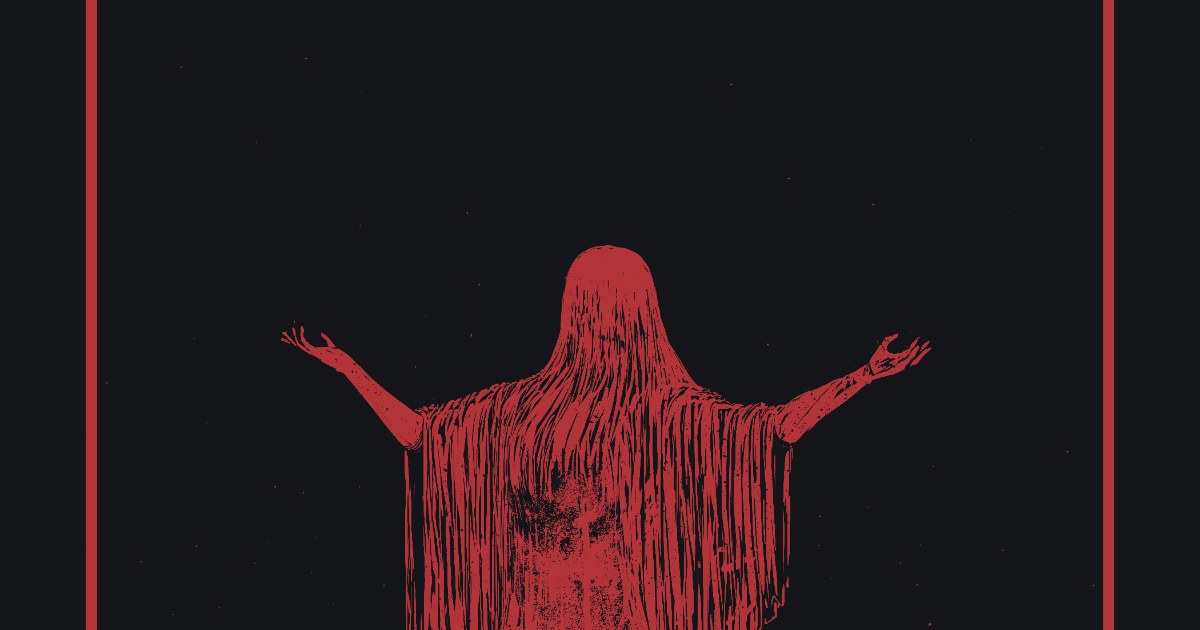
In pre-launch: Print run of You Will Die In This Place by Liz Little.
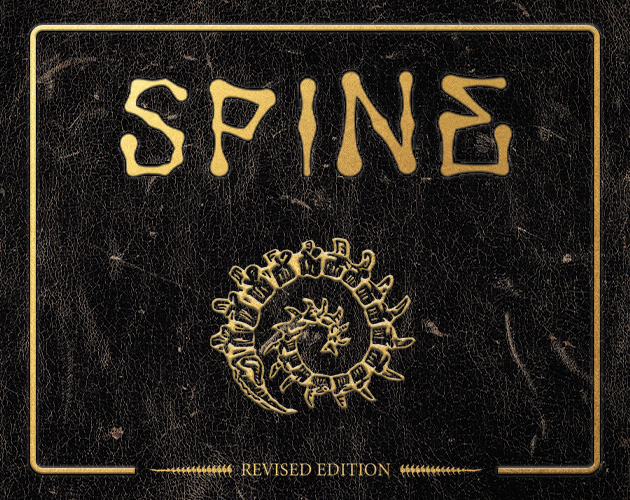
Free for a limited time





